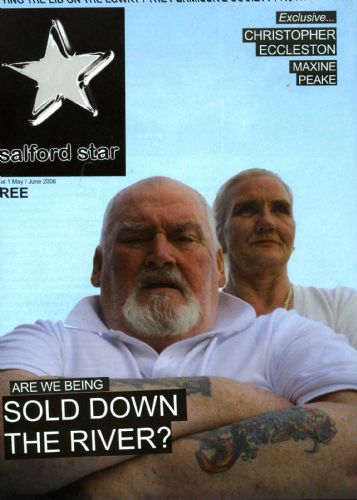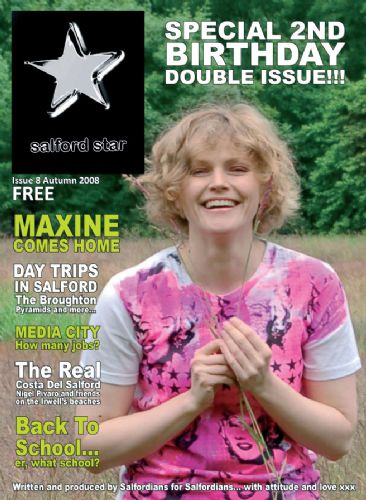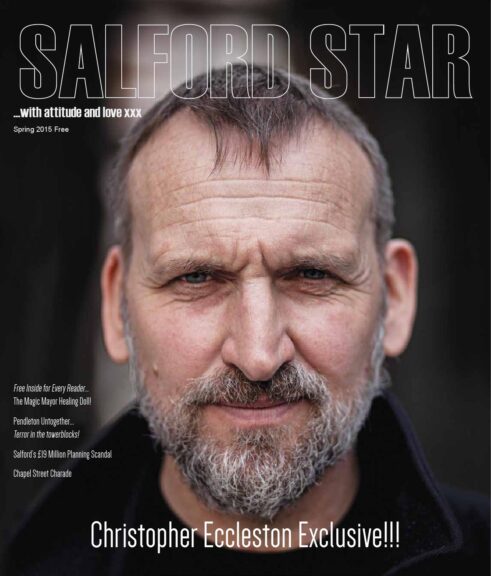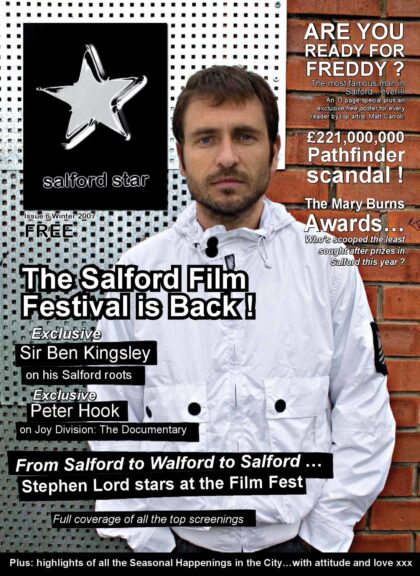The Salford Star has been shining a light on events in the city for 15 years. They have covered a diverse range of stories that have occurred in the microclimate of Salford during that time. From the fracking protests at Barton Moss, riots in Salford Precinct, floods in Lower Broughton, to local politicians involved in the political expenses scandal.
On the 1 April 2021, The Salford Star announced the closure of their online magazine, which will close after the local elections in May. Some supporters called it an April Fool’s joke. But it was no joke. Along with his co-founder Steven Speed and the board of directors, editor of the Star Stephen Kingston decided that enough was enough:
“We are closing this magazine with a smile. We are celebrating all of the hard work that our team and we have put into it. We are proud of what we’ve achieved, but enough is enough. There are only so many times that you can see the same story come back around again.”
It was around the 1 April in 2006 that the two founders decided to start a community magazine for the people of Salford, which would launch with the tag line “with attitude & love”. They saw a similar project happening in Old Trafford and thought it was exactly what communities in Salford needed. Luckily for them, the people of Salford agreed, and with the co-operation of Salfordians and their tip-offs, the Star has had many exciting scoops to break, “there has never been a dull moment” says Kingston.
The Salford Star was set to close before the pandemic hit, but they kept going to give their readers the information they needed through this challenging time. Their mission of informing the public has not been helped by a lack of information provided by Salford council. In the last Covid dominated year, Kingston says they have been given no press releases and no official information from the council. Each morning Kingston had to source the information from the Public Health website.
When Kingston and Speed started the magazine all those years ago, they researched if any recent local history had been recorded. They went to the Working-Class Movement Library in Salford, but there was nothing. Journalism has been referred to as “the first rough draft of history”, but without that first draft would a more polished version ever be produced? Salford was missing history on the regeneration of the area, the effect of the government’s policies, and the struggles for social and environmental justice across the city. The Salford Star has documented these issues during it’s time in the ascendency in Salford and that’s why Kingston felt it was important for the legacy of the Salford Star to carry on.
“We have paid for a ten-year domain name so that the articles are still there for people to see…We wanted something to be left behind from all the hard work we’ve put in over the years. And if someone wanted to do the same thing as us in the future, then they’ve got somewhere to start from. We’ve probably covered every story you could think of.”
The British Library has also agreed to archive the back catalogue of the magazine. So that the time capsule of the last fifteen years will be preserved for future researchers and historians. More than 6,000 online articles and eight full print issues will be held on their central system.
The Salford Star rose with the aim of holding power to account, particularly the local authority, and as the Star documented these first drafts of history, they also proved prescient in predicting future outcomes from the current events reported on. When regeneration plans affecting the homes of the working-class communities began, they said that it would cause a housing crisis. When the Salford council decided to close and merge the schools, the Salford Star predicted there would be a school’s crisis. Low and behold, years later, both of those things happened. How many times can you not be listened to before you throw in the towel?
“There’s a joy and a curse of being proved right over and over again. The phrase told you so, comes to mind.” Says Kingston.
Salford has had a lot of attention and regeneration over the time the Salford Star has been running. The BBC dominated Media City has been one of the biggest developments that has had a massive impact on the local economy. Searching the Salford Star for the term “Media City” returns a raft of articles documenting how this huge much vaunted development has failed to address the needs of local communities. There has been no shortage of stories to go after during the Stars last fifteen year, Kingston says:
“Anything that happens in the country always happens in Salford; you name it, we’ve had it. When Grenfell happened, we had nine blocks with the same cladding. You couldn’t write it.”
But they did write it. Kingston had no fear in publishing stories that meant something to him and his readers. Stories no one else would publish, leaving the people involved unheard and voiceless. But the Star’s growth in trust from communities across Salford came alongside a growing alienation from the authorities, whose failures were often reported on in the Star. Salford council came to see the magazine as the enemy, Kingston said. They were kicked out of council meetings and called extremists, “You wouldn’t believe the way fellow humans have treated us.”
When the Salford Star opened, Kingston says Salford Council was pretty transparent. But as the Salford Star started writing articles and asking questions about why things were happening. The more closed the council and local politicians became. Kingston Said:
“I’ve had politicians telling me I’m doing the right thing. That power needs to be held to account. But as time goes on and they become more influential, they run away scared. They don’t want to speak to me.”
When the magazine first started, it was viable. Advertisers wanted to be involved and had full-page glossy ads. But as the animosity from Salford Council intensified, more advertisers pulled away from the Star. They could no longer afford to print the magazine and get it to the poorest people who didn’t have the luxury of a smartphone or a computer. Kingston says “that level of control that the Salford council had over investors was disgusting.”
Kingston wants to thank the supporters of the magazine that have kept them publishing public interest news in Salford into 2021: “We wouldn’t have been able to do it without them. They are the ones that have come forward and given us the stories they wanted us to print…The magazine thrived from the energy of its readers.”
But that run of 15 years has taken its toll on the energy and resources of the Salford Star team, Kingston said:
“It’s just not sustainable for us to run the magazine anymore. We’ve done it for twenty-four hours a day, seven days a week for fifteen years. Getting calls at ten o’clock on a Saturday night was normal. I’ve even had calls on Christmas Day.”
The magazine has stood alongside people during some of the most troubling times of their lives. When the floods happened in Broughton, people had two foot of water in their homes and got no support. Kingston admires the fortitude of those hard done by tenants saying:
“It’s a real brave thing that these people did. They spoke out against the organisations that owned their homes. They could have been turfed out. I know some of them ended up with gagging orders.”
Stephen Kingston is letting out a sigh of relief that his time at the Salford Star is coming to an end. He, and the team, have put their all into running the magazine. With no support from the local government, the magazine has done incredibly well to survive for as long as it has. In the first year of running the paper, George Monbiot famously said, “I can think of only two local newspapers that consistently hold power to account: the West Highland Free Press and the Salford Star…”
So, what next for the editor of the Salford Star? “I’m going to spend the summer sitting in my garden and drinking.” Kingston said. Rest is well and truly needed, but a journalist like Stephen won’t be able to sit on his hands for long. He knows too much and can see through the matrix government often bamboozles the public with. Before starting the Salford Star, Stephen had a long, successful career in the national newspapers. Watch out for some of his challenging, investigative news articles popping up in other titles. He also said that he would like to write a book, and from his 15 years at the Star he has a huge amount of material to choose from to include in that book.
Before leaving the Salford Star, he also plans to write a tell-all article about his relationship with Salford council. A lot has gone on over the years between the council and Kingston and he wants to get that story out there to benefit other journalists struggling with council communications and policy.
He implores young journalists with a fire in their belly and a passion for the truth to start up their own community magazines. Society needs them to hold power to account.
Over 6000 articles are on the Salford Star website for readers to enjoy. Kingston wants to assure readers that they are not all doom and gloom. The weekend editions of the magazine celebrate all the creativity that came out of the city. From the poets, to local theatre shows, to book reviews, and local celebrities. The Salford Star has it all, and it will be sorely missed by communities across Salford who relied on it for breaking the stories that mattered to them.
To check out The Salford Star online – click here
Sign up to The Meteor mailing list for monthly meteorites delivered directly to your inbox– click here.
Feature image: composite of Salford Star images






David and Tracy Holroyd says
As the authors of the controversial, award winning book series, The Perfect Pair Dolphin Trilogy, we owe the Salford Star a HUGE debt of gratitude. Stephen Kingston stood by us when ALL other northern media outlets “ran away” to hide in corners, fearful of the powerhouse brands that pulled their strings. Thank you, Stephen Kingston and all who worked with you – your truth will be sadly missed! (David C Holroyd, Tracy J Holroyd)